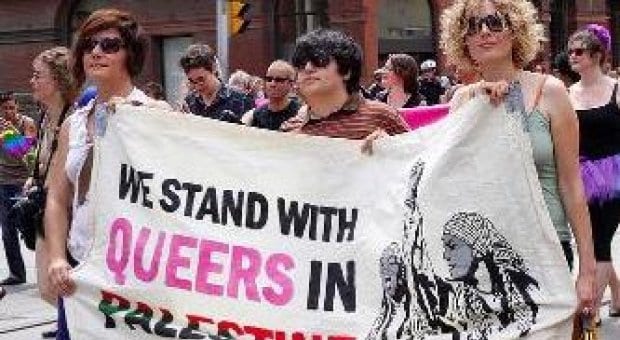Queers Against Israeli Apartheid (QuAIA) can march in the Toronto Pride parade in 2013 after arbitrators cleared the way June 6.
The decision comes two weeks before the start of the annual festival. The arbitrators’ decision is binding on Pride.
“There’s always a bit of relief,” says Tim McCaskell, a member of QuAIA. “It reconfirms that we are members of the community, that we fall within Pride’s mandate and that we’re welcome to march.”
Family lawyer Martha McCarthy chaired the panel, convened under the Pride Toronto (PT) dispute resolution process (DRP). In June 2012, a DRP panel chaired by Robert Coates dismissed a complaint filed by League for Human Rights of B’nai Brith Canada and Leon Kushner. In its July 2012 reasons, the panel found that QuAIA’s participation in the parade does not violate PT policies or the City of Toronto’s anti-discrimination policy.
The McCarthy panel heard arguments May 15 but only on a preliminary issue: could the McCarthy panel reopen the issues decided by Coates? It found that it could not. “The exact same issues are engaged as in the prior QuAIA decision,” the McCarthy panel wrote in its unanimous three-member decision. “As a decision on this matter has already been made, the Panel is bound by it and dismisses this complaint.”
For PT executive director Kevin Beaulieu, the decision shows that the DRP will follow judicial conventions on rehearing matters that they have already decided. “It’s important for us that all sides are heard,” Beaulieu says. “It’s also important, in the end, that we have a decision and there was due process.”
The arbitrators’ decision does not necessarily put an end to the QuAIA controversy, which has dogged PT since 2010. Future complaints about QuAIA’s participation could still be heard, Beaulieu says.
Paul Berner, whose complaint sparked the decision, says he has “lost a lot of respect” for PT and the complaint process. He filed his complaint shortly after the Coates decision was released. “Why did it take them 10 months to convene a panel? Why did they bring me in to make representations if they were bound by the previous decision and didn’t have jurisdiction?” he asks.
Although QuAIA’s participation was at the centre of both, Berner’s and the B’nai Brith complaint were not identical. For instance, B’nai Brith named QuAIA as the offending party, whereas Berner complained against PT for allowing the group to march. The crux of Berner’s argument was that QuAIA does not fall within the mission statement of PT, which is to “celebrate the history, courage, diversity and future of Toronto’s Lesbian, Gay, Bisexual, Transsexual, Transgender, Intersex, Queer/Questioning, 2 Spirited and Allies communities.”
Berner still believes that PT should address how QuAIA fits within its mission statement. He says PT should not “avoid dealing with the matter.”
A second complaint launched by Joe Clark was also dismissed after Clark failed to show up to the hearing.
Attention will undoubtedly now shift to city hall, where council is set to vote on funding for PT and changes to the anti-discrimination policy.
Those amendments are so “convoluted and redundant,” McCaskell says, that it’s hard to see what the point of them is. He is, nonetheless, still worried. “The downside is that they are so vague and so broad that who knows what kind of a truck they’ll want to drive through it.”
As for Pride funding, council’s executive committee passed a motion May 28 that would forbid PT from using City of Toronto cultural funding for the parade. But this does not change anything for PT, since city money has always been used for stages, performers and other elements of the festival, not the parade.
That motion will be debated at city hall June 11 or 12. Councillors may try to give the motion teeth by amending it from the floor. And for Beaulieu and McCaskell, that means queer and trans people should be contacting their city councillors to tell them to support Pride.
“The changes that have come from the staff recommendations and the changes coming from executive committee won’t have an immediate, material impact on our operations. But what we don’t know is what will happen on council floor. It’s a live issue, and we will be monitoring the situation” during upcoming council sessions, Beaulieu says.
“We’re all just waiting for what happens on Tuesday, what sort of fun and games they’re planning. Pride is pretty confident that they’ll get their funding, but I guess I’m an old worrywart and a curmudgeon. I’ll be happy when I see that it passes,” McCaskell says.
2013-06-06 Berner PTDRP Decision (2) by Danny Glenwright
2013-06-06 Clark PTDRP Decision by Danny Glenwright


 Why you can trust Xtra
Why you can trust Xtra


